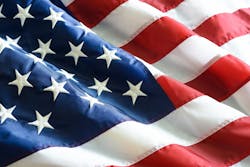So That Happened: Making Flags in America and Keeping Japanese Steel Companies Out
Editor’s note: Welcome to So That Happened, our editors’ takes on things going on in the manufacturing world that deserve some extra attention. This will appear regularly in the Member’s Only section of the site.
Not Backing Nippon
Will the last politician to support Nippon Steel Corp.’s planned purchase of U.S. Steel Corp. please turn out the lights?
Pennsylvania Gov. Josh Shapiro has added his name to the list of lawmakers who are less than thrilled about the proposed $14.9 billion acquisition, which was approved by shareholders of Pittsburgh-based U.S. Steel in April but still needs crucial regulatory approvals.
Speaking at a public event Tuesday—one not related to him potentially being picked to be Kamala Harris’ running mate—Shapiro sided with the United Steelworkers.
“If the U.S. Steelworkers aren’t happy with this deal, which they are not, I’m not happy with this deal,” Shapiro said. “If I don’t see a future where U.S. Steel manufacturing continues here in the Commonwealth of Pennsylvania, and is expanded from what is happening right now, I’m not happy. So, I’ve got really serious concerns.”
In not backing Nippon Steel’s plans, Shapiro joins President Joe Biden and former President Donald Trump as well as a hatful of Pennsylvania’s D.C. contingent. And from the sound of it, they and others shouldn’t expect a decision soon from the U.S. Treasury’s Committee on Foreign Investment in the United States: At Tuesday’s event (which focused on an Internal Revenue Service initiative), Treasury Secretary Janet Yellen declined to comment specifically but also spoke in the future tense about CFIUS’ review. There’s plenty of time for other lawmakers to join the no-Nippon chorus.
—Geert De Lombaerde
Hall of Fame Inductees
- Anne Berg, Vice President Manufacturing Agricultural Solutions Americas – BASF
- Mary Betsch, VP Sustainability – Ingersoll Rand
- Lisa Caldwell, Americas Business Consulting Managing Partner – EY
- Rhonda Gilyard, Vice President of Administration and Production Control – Mazda Toyota Manufacturing
- Elizabeth Hoegeman, Executive Director of HSE and Global Manufacturing – Cummins Inc.
- Laura Maxwell, Senior Vice President, Supply Chain – PepsiCo Foods North America
- Misti M. Rice, Executive Director of Government Affairs – Magna
- Sandra Rodríguez-Toledo, Vice President Site Operations – Amgen
- Jane Rosaasen, General Manager – Daimler Truck
- Julie Waymouth, Senior Vice President of Operations – Kymera International
New Names in the Hall of Fame
Recognizing leaders who have substantially supported, promoted and inspired women in the manufacturing field, the Women in Manufacturing Association (WiM) has announced the fifth group of honorees to be welcomed to the Women in Manufacturing Hall of Fame. WiM has selected 10 leaders for the 2024 inductee class.
“It is with immense pride that we welcome these extraordinary women into the Women in Manufacturing Hall of Fame,” said WiM Board Chair Jana Gessner of PepsiCo. “By celebrating their success and honoring their valuable contributions, we encourage the next generation of women leaders and ensure the continued advancement of women in the industry.”
After being nominated by colleagues and peers, the honorees were chosen by a judging panel of WiM’s leadership and executive committee. The 2024 class features leaders from Ingersoll Rand, BASF, Magna and other companies.
A reception to officially welcome the inductees will be held on Oct. 6 as part of the 14th annual WiM SUMMIT.
“These remarkable women have set new standards for future generations of manufacturing careers,” says WiM President and Founder Allison Grealis. “We look forward to honoring these leaders and celebrating their commitment to fostering diverse and inclusive workplaces in the industry.”
—Anna Smith
A Busy July for Johnson Controls as Manufacturer Announces Big Sale, Retirement of CEO
Last week Johnson Controls International announced that it would sell its residential and light commercial HVAC business to the Bosch Group in an all-cash deal valued in total at $8.1 billion, with the company's portion of the consideration valued at approximately $6.7 billion. If all goes according to plan, the deal should close in 12 months, according to Johnson Controls.
The building technology manufacturer wasn’t done with big July news, however.
Today (Wednesday, July 31) Johnson Controls reported that CEO George Oliver will retire from the company. Oliver, who was named chairman and CEO in 2017, will remain CEO until a successor is named and continue as the board chair once a new CEO is aboard. The company says it has initiated a search for the next Johnson Controls CEO.
Additionally, in what the manufacturer described as "following a constructive dialogue with Elliott Investment Management," Patrick Decker, retired president and CEO of Xylem Inc., has been added to Johnson Controls' board of directors, effective immediately.
"As one of Johnson Controls' largest investors, we believe the leadership and board actions announced today along with the recent portfolio changes position the Company to realize the benefits of its transformation, enhance operational performance and drive significant shareholder value creation,” Elliott partner Marc Steinberg said in Johnson Controls' news announcement.
"We appreciate the productive discussions we've had with George and his team and today's financial results make it clear that Johnson Controls is on the right path to capitalize on the opportunities ahead," Steinberg added.
The financial results of which Steinberg speaks are Johnson Controls' third-quarter earnings, which were released this morning. Net sales of $7.2 billion were up 1% over the same period a year ago.
—Jill Jusko
More Flags to be Sourced & Stitched in the USA
The United States of America's government's United States of America flags are about to get even more American. A new bipartisan bill, the All-American Flags Act, sponsored by Senator Susan Collins (R-MA) and Sherrod Brown (D-OH), has passed the House of Representatives and moved to the White House, where President Biden is expected to sign it into law.
The bill will require that the United States federal government only purchase United States flags that were manufactured in the United States using materials sourced from — you guessed it — the United States.
In a statement after the bill passed the House, Senator Collins said the bill was appropriately respectful of the flag as a symbol of U.S. values. "To honor its significance, the federal government should only use flags entirely manufactured in the United States," she said.
The bill's co-sponsor, Senator Brown, said the bill would have more than symbolic significance. "American flags should be made in America, period," he said, adding that requiring the government to purchase goods "made in America, whenever taxpayer money is involved, puts America to work."
Existing legislation only requires the government to buy flags with at least 50% American-made materials. The new legislation, once it becomes law, will require the heads of government agencies to purchase only 100% U.S.-made flags, unless they determine doing so would require compromising the flags' quality.
At least one other bill is still in the works to promote U.S.-sourced American flags. The National Independent Flag Dealers Association notes that the AAFA does not go as far as the "Make American Flags in America Act," a different bill promoted by Senator Ted Cruz (R-TX) and Congresswoman Elise Stefanik (R-NY). The MAFAA would direct the Federal Trade Commission to improve country-of-labelling laws for American flags and prevent fraud. "What we're seeing on Amazon is misleading ways of titling products," said CEO Liz Morris of NIFDA. "It has become more and more of an issue recently, so we're pushing for transparency and honesty."
According to the offices of Senators Collins and Brown, the U.S. imported 10 million American flags in 2017, of which more than 99% were made in China.
—Ryan Secard
About the Author
Geert De Lombaerde
Senior Editor
A native of Belgium, Geert De Lombaerde has been in business journalism since the mid-1990s and writes about public companies, markets and economic trends for Endeavor Business Media publications, focusing on IndustryWeek, FleetOwner, Oil & Gas Journal, T&D World and Healthcare Innovation. He also curates the twice-monthly Market Moves Strategy newsletter that showcases Endeavor stories on strategy, leadership and investment and contributes to other Market Moves newsletters.
With a degree in journalism from the University of Missouri, he began his reporting career at the Business Courier in Cincinnati in 1997, initially covering retail and the courts before shifting to banking, insurance and investing. He later was managing editor and editor of the Nashville Business Journal before being named editor of the Nashville Post in early 2008. He led a team that helped grow the Post's online traffic more than fivefold before joining Endeavor in September 2021.
Anna Smith
News Editor
News Editor
LinkedIn: https://www.linkedin.com/in/anna-m-smith/
Bio: Anna Smith joined IndustryWeek in 2021. She handles IW’s daily newsletters and breaking news of interest to the manufacturing industry. Anna was previously an editorial assistant at New Equipment Digest, Material Handling & Logistics and other publications.
Jill Jusko
Bio: Jill Jusko is executive editor for IndustryWeek. She has been writing about manufacturing operations leadership for more than 20 years. Her coverage spotlights companies that are in pursuit of world-class results in quality, productivity, cost and other benchmarks by implementing the latest continuous improvement and lean/Six-Sigma strategies. Jill also coordinates IndustryWeek’s Best Plants Awards Program, which annually salutes the leading manufacturing facilities in North America.
Have a story idea? Send it to [email protected].
Ryan Secard
Associate Editor
Ryan Secard joined Endeavor B2B in 2020 as a news editor for IndustryWeek. He currently contributes to IW, American Machinist, Foundry Management & Technology, and Plant Services on breaking manufacturing news, new products, plant openings and closures, and labor issues in manufacturing.


